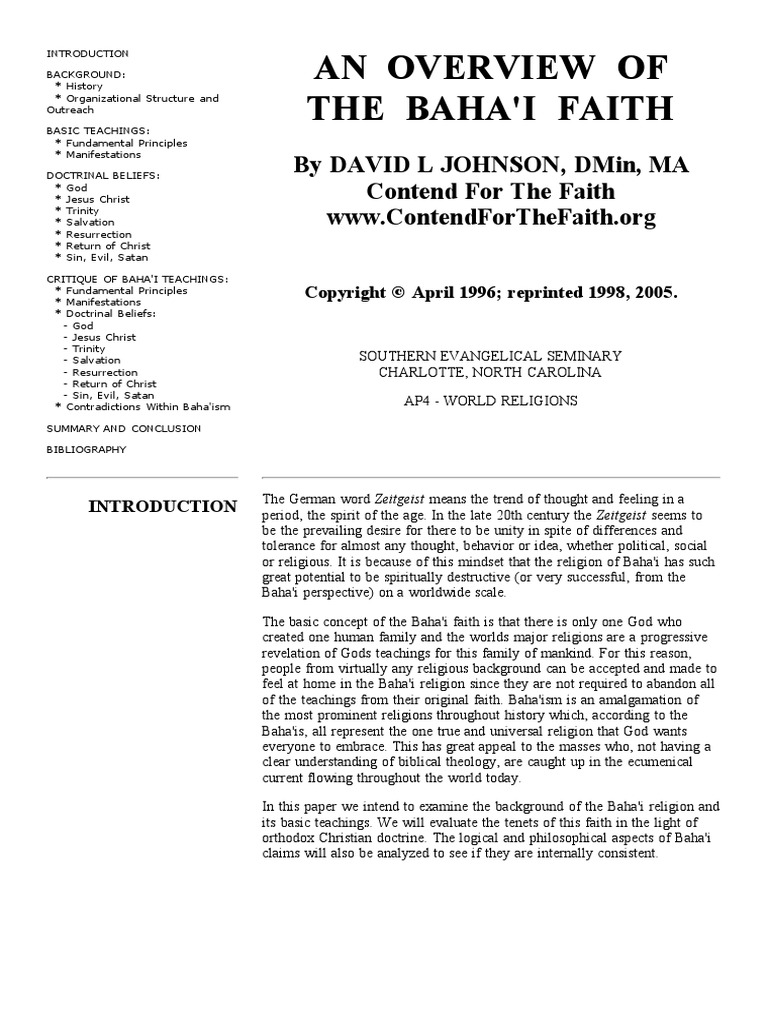The Baha’i Faith, an increasingly prominent religious tradition founded in the mid-19th century, embodies an extraordinary amalgamation of teachings that resonate profoundly with the tenets of unity, equality, and the pursuit of knowledge. This faith, rooted in the revelations of Bahá’u’lláh, the prophet-founder, provides a comprehensive spiritual and social framework that seeks to unite humanity. Below, the multifaceted aspects of Baha’i teachings are explored, offering insights that can enrich one’s understanding of this vibrant faith.
1. The Concept of Unity
Central to Baha’i teachings is the principle of unity. Bahá’u’lláh articulated that humanity is one family, transcending artificial barriers such as race, nationality, and religion. This concept of oneness is not merely idealistic; it urges followers to actively cultivate harmony and understanding among diverse communities. The teachings encourage the dissolution of prejudices and underscore the significance of cooperative existence. As such, Baha’is are called to champion social justice and foster relationships grounded in respect and compassion.
2. The Role of Divine Revelation
According to Baha’i belief, God has revealed His will progressively over time through a succession of prophets and messengers. This line of revelation includes figures such as Moses, Jesus, Muhammad, and ultimately Bahá’u’lláh himself. Each Messenger has contributed to a divine mosaic, revealing truths appropriate for their respective eras. Baha’is view Bahá’u’lláh’s teachings as not only a continuation but also a culmination of these prophetic messages, which provide guidance for contemporary challenges. This perspective establishes a continuity of divine wisdom rather than a singular, isolated revelation.
3. Individual Transformation and Spiritual Growth
The Baha’i Faith places significant emphasis on the individual’s pursuit of spiritual development. This process encompasses the cultivation of virtues such as honesty, kindness, and patience. Baha’is are encouraged to engage in lifelong learning and self-improvement. A core tenet is the belief that personal transformation is vital to the transformation of society. Individual actions are seen as reflections of the greater collective; hence, personal growth parallels the advancement of humanity.
4. The Equality of Men and Women
The equality of men and women stands as a cornerstone of Baha’i teachings. This principle is not merely a social ideal but a fundamental tenet that permeates all aspects of Baha’i life. The Faith advocates for the full participation of women in all spheres, from education to leadership. Baha’i writings assert that the progress of society is irrevocably tied to the empowerment of women. This emphasis on gender equality is revolutionary, challenging entrenched sociocultural norms and promoting a balanced collaboration towards societal betterment.
5. The Importance of Education
Education is heralded as an essential element for both individual and societal advancement within Baha’i teachings. Baha’is are encouraged to pursue knowledge in all its forms, recognizing that the development of intellectual capacities is vital for the realization of a just and equitable society. Baha’i educational initiatives focus not only on academic instruction but also on moral and spiritual education. This holistic approach aims to nurture compassionate and responsible individuals equipped to address global issues.
6. Service to Humanity
Service is a fundamental expression of Baha’i belief. The Faith teaches that true fulfillment is found in seeking the welfare of others and contributing positively to the world. Baha’is engage in countless initiatives aimed at community building, social action, and humanitarian efforts. The motivation for such service arises from the understanding that every act of kindness can pave the way for broader social transformation. This aligns with the Baha’i vision of a collaborative, interdependent world where individuals support one another in striving for common goals.
7. Consultation as a Method of Decision-Making
Consultation holds a prominent place in the Baha’i administrative framework. The process is characterized by open dialogue, respect for differing viewpoints, and a collective search for truth. This method allows for decisions to be reached through mutual respect and a commitment to the greater good. Baha’is believe that such collaborative discourse leads to more just and equitable outcomes than decision-making based solely on authority or individual preference. Consultation is seen not merely as a procedural formality but as an essential practice that fosters unity and understanding.
8. Non-Interference in Politics
The Baha’i Faith advocates for a distinct separation of religion and politics. Baha’is are encouraged to refrain from partisan politics, instead focusing their energy on uplifting humanity through spiritual and social development. This stance does not imply apathy toward social issues; rather, it underscores the principle that spiritual solutions must prevail over political machinations. Baha’i teachings encourage followers to participate in public discourse positively, albeit from a spiritual and principled standpoint.
9. The Vision of a Just World Order
Baha’i teachings envision a global utopia characterized by the establishment of a just and equitable world order. This vision encompasses the elimination of poverty and the eradication of prejudice, alongside the promotion of universal education and the protection of human rights. The Baha’i community actively engages in advocating these ideals, believing that a divine framework can guide humanity toward sustainable peace and harmony. Such aspirations not only reflect the ethos of the Baha’i Faith but also serve as a clarion call for collective action toward global betterment.
Conclusion
The Baha’i Faith embodies a profound and comprehensive vision of existence, rooted in the principles of unity, equality, and service. By embracing these teachings, individuals can embark on a transformative journey of self-discovery and collective advancement. This path, characterized by a commitment to justice and altruism, engenders a profound impact on both individual lives and the broader society, fostering a world that mirrors the ideals espoused by this enlightened faith.
